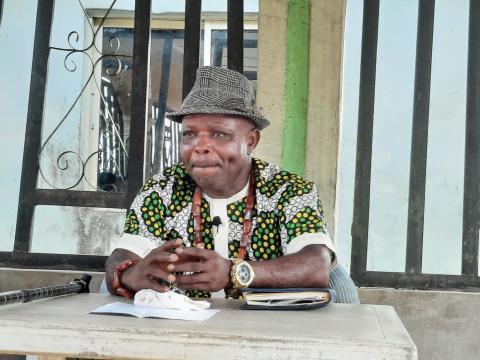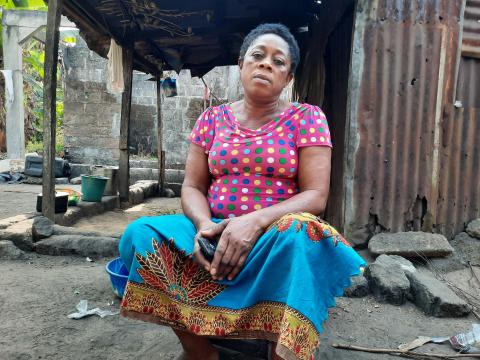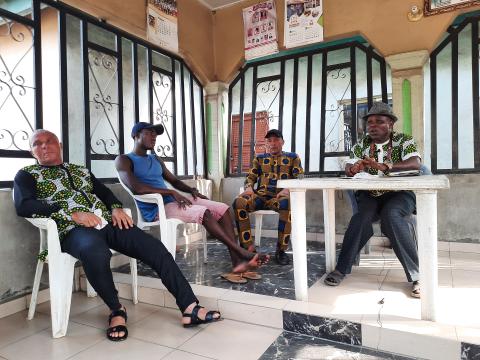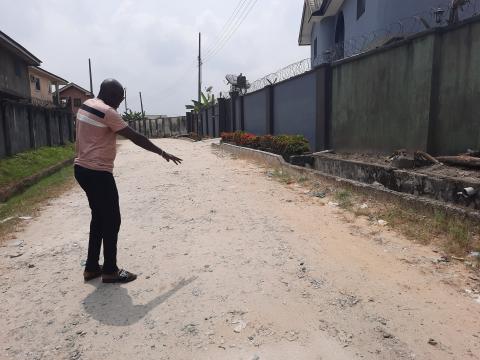
"The frantic strides weren’t enough to save this victim. Soon a bullet hit Joseph right inside the car and then another when he attempted to crawl to safety. He died on the spot…"
On Thursday, April 9, 2020, ten days after Nigeria entered a partial lockdown due to the COVID-19 pandemic, officers of the Nigeria police, army, correctional service and others had extra-judicially killed 13 while enforcing the curfew – the virus had only claimed six lives then. By May 4, when the government eased the lockdown, about 20 persons had been killed in similar circumstances. For three months, investigative journalist, Kemi Busari, followed the trails of these arbitrary killings which have left many families devastated, with no hope of justice.

Before she met her untimely death in April 2020, Lovender Elekwachi had served the Nigeria Police for 13 years.
Her journey to the force started on July 1, 2007, when she was recruited. She had risen to the rank of a sergeant and was due for a promotion in 2020 but a fellow officer terminated her life.
Lovender was on duty as a traffic warden at the Eneka Roundabout in Port-Harcourt, South-south Nigeria when she was shot dead by a fellow officer identified as Bitrus Osaiah, also a sergeant.
The 35-year-old mother of one was on duty around 2 p.m. when members of the Rivers State Taskforce on Road Decongestion, Illegal Street Trading and Motor Parks arrived to disperse traders around the roundabout.
Sergeant guns down sergeant
The date was April 23, 2020. Then, the Rivers State Government had just announced a closure of all markets in the state and later a total lockdown.
Soon, the enforcement led to harassment of some traders much to the dissatisfaction of Lovender. Many witnesses who spoke to PREMIUM TIMES said Lovender left her post and attempted to pacify police officers, who accompanied the task force members, to stop carting away the traders’ goods. This move was rebuffed irritably by Osaiah. He reportedly opened fire. Moments later, Lovender dropped dead.
She died about ten metres away from a shop belonging to Udoka Luke, a generator repairer. Luke had abandoned his work to watch the whole episode unfold that afternoon.
“That day, there was task force packing people’s load over here,” he said. “Everybody was on the run, all the people that sell at the roadside, all of them ran away. Later, those boys that stand (stood) at the side of the road, those agberos (illegal traffic managers), were the ones that start(ed) using coke bottles to throw at the police and the task force.
“As the packing (of goods by Task Force officials) was going on, the policewoman (Lovender) was sitting somewhere there (around the roundabout), she now stands (stood) up to come and help because sometimes, if the task force people come, the police here use to come and defend the owners, they will now leave the goods for them. Immediately she stands (stood) up to go and defend that one that particular day, I saw her, she fell immediately. I was even the one that later rushed and saw that the woman was already dead.”
Luke, corroborated by other witnesses, said the police officers had shot twice towards the irate agberos (touts, mostly disguised as traffic assistants).
Once Osaiah and his colleagues saw that Lovender was dead, they zoomed off. The traders were quick to alert Lovender’s colleagues at the Eneka Police Station some 500 metres away. The officers chased and soon caught up with the fleeing assailant.
While the task force raid was ongoing, some traders who sell goods at the roadside were arrested and held behind Hilux vans. Joseph Francis, who repairs phones and sells accessories, was one of those arrested.
Francis said the fruit seller, whom the team was harassing at one moment of their operation, was a friend to Lovender and her attempt to rescue this friend led to her death.
Female sellers approached at the junction were not willing to talk for fear of being subjects of attack. One of them who spoke on condition of anonymity said they live in fear of harassment by the task force but that they (task force) had not shown up at the junction since the incident.
Breadwinner gone
Lovender’s parent, Matthew Elekwachi and Mary Elekwachi couldn’t hide their emotions when PREMIUM TIMES visited the family home.
Both parents were in their Izu residence in Etche Local Government when the call announcing the death came in. Rattled, Mr Elekwachi dashed to the roundabout where he met the lifeless body of his daughter.
Mr Matthew, a chief, was proud of her daughter’s last act - compassion towards the traders – at the same time, he is sad the family support is gone.

Before her death, Lovender lived around Eneka with her husband and their two-year-old son, Great Chimezie. Her sibling, Goddey Elekwachi, was also living with the family.
Goddey, 25, was nursing the prospect of studying Electrical Electronics at the University of Port-Harcourt and her sister had promised to handle the financial responsibility. The dream is now an impossibility as Goddey had to return to the village.
A visibly sad Mary Elekwachi said her livelihood depends entirely on unfailing aid from Lovender. She fought back tears while the interview lasted.
“Lovendar is (was) very good to me oooo…my son has stopped school because there is no one to train him, there is a house Lovender is building for me. Many things Lovender is doing for me, now nobody to do it again,” she said.

Apart from the assistance to her siblings, Lovender had placed her mum on a monthly stipend; she bought a farmland for the mum; she employed labourers to work on her farm at every farming season; she was also building a six-bedroom structure inside their compound for the family to have more comfort. She also enrolled her mum in medical care.
All these are now gone, taken away by a single bullet by a colleague.
The road to justice
All the family wants now is justice. Indeed, they have made some attempts at getting one. In May, 2020, a lawyer engaged by the family, Jerome Okere, wrote the Rivers State Governor, Nyesom Wike, pleading that the family be compensated for their loss. The letter was acknowledged by the Office of the Chief of Staff on June 4 but nothing has been achieved.
Mr Okere is also holding brief for the family in the case filed by the police. He said not much progress has been made.
“The matter was charged to magistrate court and the court declined jurisdiction. They don’t have the power to hear trial matters relating to murder. So, the file was referred to DPP and since then nothing has been done,” he said.
The family said that Lovender’s salary was only paid for three months after her death and that despite they perfecting documentation months ago, her entitlements have not been paid.

Nnamdi Omoni, the spokesperson of Rivers Police Command asked for ‘consultation time’ to revert when asked questions on these but he couldn’t provide answers after a follow-up.
He advised the family to approach the police ‘’to iron out encumbrances’’.
The PRO said Osaiah, the assailant, has been dismissed from the police. “He has been dismissed and charged to court. He is currently facing trial,” he said.
The family, corroborated by their lawyer, also alleged that the police informed them in August 2020 that they received ‘’orders from above’’ that the case should be transferred to Abuja which they rebuffed. Mr Omoni said he is not aware.
While bureaucracy continues to stall the case, the Elekwachi’s continue to live in double agony; one, that Lovender has not been buried yet due to the lingering case and that justice has not been served.
“The whole justice has been denied…how do I expect justice again? It is assumed that justice has been denied,” a frustrated Matthew said. “I want justice. The person that killed her, if you know what to do (to him) do it,” a more frustrated Mary, addressing the authorities, adds.
Day trigger-happy soldier went on rampage in Warri
The day was April 2, 2020, around 9 a.m. Most businesses in Warri, an oil-producing city in Nigeria’s South-south, were closed due to the lockdown sanctioned by the government.
While the clock was ticking, a gunshot was heard on Bridgeview Road in the Ugbuwague area of the city. Unfamiliar with such a distraction, residents came out. They were met by the sight of a dead body – the body of 28-year-old Joseph Pessu with blood still gushing out.

A few minutes before the gunshot, Joseph, driving in a car, had been stopped by soldiers at the Ubeji checkpoint, not very far from his house. One of the soldiers at the checkpoint, identified as Ilekura Ajayi, was reportedly unsatisfied with Joseph’s ‘conduct’.
He was said to have asked Joseph why he wanted to hit him with the car. A mild argument ensued and Joseph drove off.
A while later, the father of two noticed the soldier was chasing him, first on foot and later in a vehicle. Two gunshots followed, one hitting the tire. Joseph kept driving.
His destination was his father’s house in Ugbuwangue. He was about 700 metres away, when he couldn’t move again. The exit from Bridgeview Road had been closed by residents, probably due to the lockdown.
Sensing he might be caught by a hail of bullets from the angry soldier, Joseph hastily hopped down from the vehicle and dashed to the adjoining Mene-Akpata Street. Ajayi pursued with his gun.
The frantic strides weren’t enough to save this victim. Before he could wriggle out of the car, a bullet hit him and then another when he attempted to crawl to safety.
He died on the spot.

Ani Iyonsi, a resident who lives close to the scene witnessed the shooting. “I was at home when I heard the gunshots. They shot him through the back of the car which hit him by the side,” he said.
About three streets away, Joseph’s father, Monday Pessu, was waiting for his son. He had called him earlier to come and assist him to the hospital to check his failing health. It was a journey Joseph never made.
Back to the scene of the shooting, residents had started to gather and a call was put through to Monday who arrived at the scene in no time, despite his health. His first instinct was to attack Ajayi but he was soon calmed by residents now preparing for protest.
Monday hauled the dead body of his son to the back of his Hilux van and then followed some soldiers to the A Division Police Area Command. The body was later deposited at the mortuary. Nothing has been heard from the authorities since then.
“After it happened, nobody came to me. It was the deputy governor who came for a condolence visit (based on the fact that) we are party members. From then on, nobody came but the matter is in court. I need justice,” the 66-year-old Monday said.
The family filed a case against the Nigerian Army claiming damages. The case with suit number FHC/WR/CS/48/2020 was filed at the Warri Division of the Federal High Court. Lawyer to the family, Clem Ade Omotoye said a hearing on the matter was about to commence at the Federal High Court, Warri.
Words not matching actions
Addressing journalists on March 30th, 2020, the spokesperson, Directorate of Defence Media Operations, John Enenche, a Major General, said that the military would not be involved in punishing residents who flout COVID-19 lockdown rules.
“Penalties will be left for the police, it’s not for the military,” he said. “I shouldn’t tell you that this is the penalty for any person that flouts the directive of staying at home, of wandering from one place to the other. It should be with the police because it is their force responsibility. What we normally do is provide aid to civil authorities. But as I speak with you, we now have the legality to work them if they call us.”
Ajayi acted contrary to the words of the top ranks of the Nigeria’s Defence Directorate. Worse still, the army has so far condoned this act.
There is no known investigation or retribution for the erring officer further aggravating discontent within the victim’s family.
Section 106 of Nigeria’s Armed Forces Act states that “ a person subject to service law under this act who, without justification or excuse, unlawfully kills another person… is guilty of murder and liable, on conviction by a court-martial, to suffer death.”
Calls and text messages to the spokesperson of the 6 Division of Nigerian Army, Charles Ekeocha, a major, were not responded to.
Ordinarily, as enshrined in the constitution, the Nigerian military are majorly saddled with the responsibility of protecting the national borders from external aggression but years of military rule and incompetence of the Nigeria police have made the military an added apparatus for maintaining law and order within the state.
Asked if the case was transferred to the police, Delta Command Public Relations Officer of the Nigeria Police, Onome Onovwakpoyeya, requested more details and time but has yet to revert as of press time despite a follow-up.